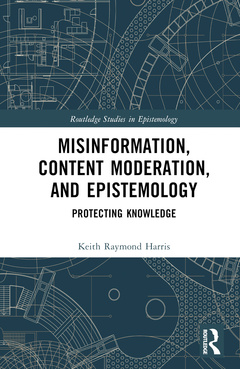Misinformation, Content Moderation, and Epistemology Protecting Knowledge Routledge Studies in Epistemology Series
Auteur : Harris Keith Raymond

This book argues that misinformation poses a multifaceted threat to knowledge, while arguing that some forms of content moderation risk exacerbating these threats. It proposes alternative forms of content moderation that aim to address this complexity while enhancing human epistemic agency.
The proliferation of fake news, false conspiracy theories, and other forms of misinformation on the internet and especially social media is widely recognized as a threat to individual knowledge and, consequently, to collective deliberation and democracy itself. This book argues that misinformation presents a three-pronged threat to knowledge. While researchers often focus on the role of misinformation in causing false beliefs, this deceptive potential of misinformation exists alongside the potential to suppress trust and to distort the perception of evidence. Recognizing the multifaceted nature of this threat is essential to the development of effective measures to mitigate the harms associated with misinformation. The book weaves together work in analytic epistemology with emerging empirical work in other disciplines to offer novel insights into the threats posed by misinformation. Additionally, it breaks new ground by systematically assessing different forms of content moderation from the perspective of epistemology.
Misinformation, Content Moderation, and Epistemology will appeal to philosophers working in applied and social epistemology, as well as scholars and advanced students in disciplines such as communication studies, political science, and social psychology who are researching misinformation.
The Introduction and Chapter 1 of this book are freely available as downloadable Open Access PDFs at http://www.taylorfrancis.com under a Creative Commons Attribution-Non Commercial-No Derivatives (CC-BY- NC- ND) 4.0 license.
Introduction: Knowledge Under Threat Part 1: The Threat of Misinformation 1. How Misinformation Prevents Knowing 2. Conspiracy Theories and Runaway Skepticism 3. Ambiguity, Fakery, and Social Evidence Part 2: The Promise of Content Moderation 4. Damned if You Do: The Case Against Content Moderation 5. Damned if You Don’t: The Case for Content Moderation 6. Collaborative Content Moderation Epilogue: Online, Digital Soldiers
Keith Raymond Harris is a postdoctoral researcher in philosophy at Ruhr-Universität Bochum, where he specializes in social and applied epistemology and the philosophy of cognitive science. His recent publications include “Real Fakes: The Epistemology of Online Misinformation,” “Epistemic Domination,” and “Beyond Belief: On Disinformation and Manipulation.”
Date de parution : 04-2024
15.2x22.9 cm
Thème de Misinformation, Content Moderation, and Epistemology :
Mots-clés :
Keith Raymond Harris; applied epistemology; political epistemology; social epistemology; epistemology of the internet; disinformation; fake news; conspiracy theories; misinformation; content moderation; false beliefs; echo chambers; evidential distortion; social media testimony; manipulation; deception; collective deliberation; protecting knowledge


